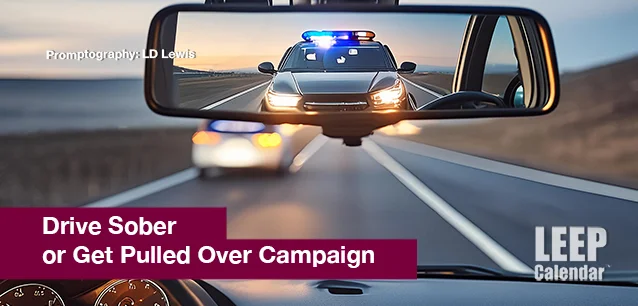 AD
AD
Today is: November 13
Scroll to explore events active on this date.
Additional Events on LEEP
LEEP INK FEATURES

August is Appropos
A toddler playing in the fountain at a park in Santa Fe, New Mexico—Photo LD Lewis. In August, we live through the Dog Days of Summer. It's hot and often humid, and those ...

September is Sassy
Can you hear that sigh of relief from parents worldwide? Yes! September marks the return of students to school, a global phenomenon. Preparations for the ACT and SATs begin earnestly for ...

OOH LA LA, October
October is the busiest month for events, with 5% more happening than in May, the second most eventful month. Sailing enthusiasts will be glued to the finals of this year's Am...
About National Drive Sober or Get Pulled Over Month
Alcohol Tobacco & Drugs , Legal
United States
Ends: Jan 01, 2025
DESCRIPTION:
NATIONAL DRIVE SOBER OR GET PULLED OVER CAMPAIGN
Each year, from mid-December through New Year's Day, the United States observes the National Drive Sober or Get Pulled Over campaign, a crucial initiative to reduce drunk and drugged driving and promote road safety during the holiday season. The National Highway Traffic Safety Administration (NHTSA) champions the event in partnership with local law enforcement agencies, advocacy groups, and community organizations.
THE PURPOSE OF THE CAMPAIGN
National Drive Sober or Get Pulled Over seeks to raise awareness about the dangers of drunk driving, increase enforcement of DUI laws, and ultimately save lives. The campaign emphasizes the importance of making responsible choices and ensuring everyone reaches their destinations safely. It combines public education efforts with increased police presence and sobriety checkpoints to deter impaired driving.
The holiday season is precarious for road accidents due to inclement weather, increased travel, and celebrations. According to the NHTSA FARS report, an average of 1,400 deadly collisions occur during the annual winter triumvirate of Thanksgiving, Christmas, and New Year's. Only the combined weekends of Memorial Day, Fourth of July and Labor Day are higher. Statistics indicate that nearly one-third of all traffic crash fatalities in the United States involve drunk drivers, and the holiday period sees a marked increase in such incidents.
GETTING HOME SOBER
To prevent drunk driving, individuals can take several responsible actions:
Designate a Sober Driver: Plan ahead by choosing a sober friend or family member to drive if you plan to consume alcohol.
Use Ride-Sharing Services—Utilize ride-sharing apps or call a taxi to ensure a safe ride home.
Public Transportation—Take advantage of public transportation options, which are often more available during the holiday season.
Stay Overnight—If you're attending a party or gathering, consider staying overnight to avoid driving after drinking.
Plan Non-Alcoholic Activities—Organize holiday activities that don't involve alcohol to eliminate the risk of impaired driving.
The campaign's message is clear: driving under the influence of alcohol is dangerous and illegal. Law enforcement agencies ramp up their efforts nationwide during this period, setting up sobriety checkpoints and increasing patrols to catch impaired drivers and prevent accidents.
National Drive Sober or Get Pulled Over plays a vital role in reminding the public of the severe consequences of drunk driving, including legal penalties, injuries, and fatalities. By promoting responsible behavior and providing practical alternatives to drinking and driving, the campaign aims to make the roads safer for everyone during the holiday and throughout the year.
WHAT DOES IT COST IF YOU GET A DUI?
Driving under the influence (DUI) is a serious offense in the United States, carrying significant financial, legal, and personal consequences. The actual cost will depend on the state you're arrested in. Here's a breakdown of the typical costs and consequences associated with a DUI
FINANCIAL COSTS
LEGAL FEES
Attorney Fees—Hiring a DUI attorney can cost anywhere from $1,500 to $10,000, depending on the complexity of the case and the lawyer's experience.
Court Fines—DUI fines vary by state but typically range from $300 to $2,000 for a first offense. Repeated offenses result in higher fines.
INSURANCE FEES
Insurance Premiums—A DUI conviction can cause your car insurance premiums to skyrocket. On average, premiums can increase by $1,000 to $3,000 per year for several years following a DUI.
EMPLOYMENT CONSEQUENCES
Job Loss—A DUI can jeopardize your employment, especially if your job involves driving or if you hold a professional license.
Future Employment—A DUI conviction on your record can make it difficult to secure future employment, as many employers conduct background checks. It will also prevent you from taking opportunities overseas in multiple countries.
PERSONAL AND SOCIAL CONSEQUENCES
Reputation—A DUI conviction can damage your personal and professional reputation, affecting relationships and social standing.
Travel Restrictions—Many countries, including Canada, have strict entry restrictions for individuals with DUI convictions, limiting travel options.
ADDITIONAL COSTS
Bail—Posting bail after a DUI arrest can cost between $150 and $2,500, depending on the offense's jurisdiction and nature.
Alcohol Education Programs—Many states require DUI offenders to attend alcohol education or treatment programs, which can cost between $150 and $500. Others require one year's attendance for two hours a week at Alcoholics Anonymous meetings.
Ignition Interlock Device—Some states mandate the installation of an ignition interlock device, which prevents the car from starting when alcohol is detected on the driver's breath. Installation and monthly fees can add up to $2,000 annually.
License Reinstatement Fees—After a DUI, drivers often must pay fees ranging from $100 to $250 to reinstate their suspended licenses.
Jail Time—In many states, a first-time DUI offense can result in jail time ranging from a few days to six months. Some states may offer alternatives like community service. Subsequent offenses typically result in longer jail sentences, potentially up to several years.
License Suspension—A DUI can result in a six-month to one-year driver's license suspension. Multiple offenses can result in longer suspensions, potentially leading to permanent revocation.
CONCLUSION
The total cost of a DUI in the United States, combining legal fees, increased insurance premiums, and other related expenses, can easily exceed $10,000. Beyond the financial burden, the legal and personal consequences of a DUI conviction are significant, impacting various aspects of an individual's life throughout their lifetime.
As the campaign continues to gain traction, it serves as a powerful reminder of the collective responsibility to prevent drunk and drugged driving. Through education, enforcement, and community involvement, National Drive Sober or Get Pulled Over strives to protect lives and ensure that the holiday season remains a time of joy and celebration, free from the tragedy of impaired driving accidents.
VIDEOS
SUPPORTING DOCUMENTS
Currently, this event does not have supporting documents.
ADDITIONAL IMAGES
Currently, this event does not have supporting images.
Where would you like to go now?
 AD
AD


/footer-logo.svg)
